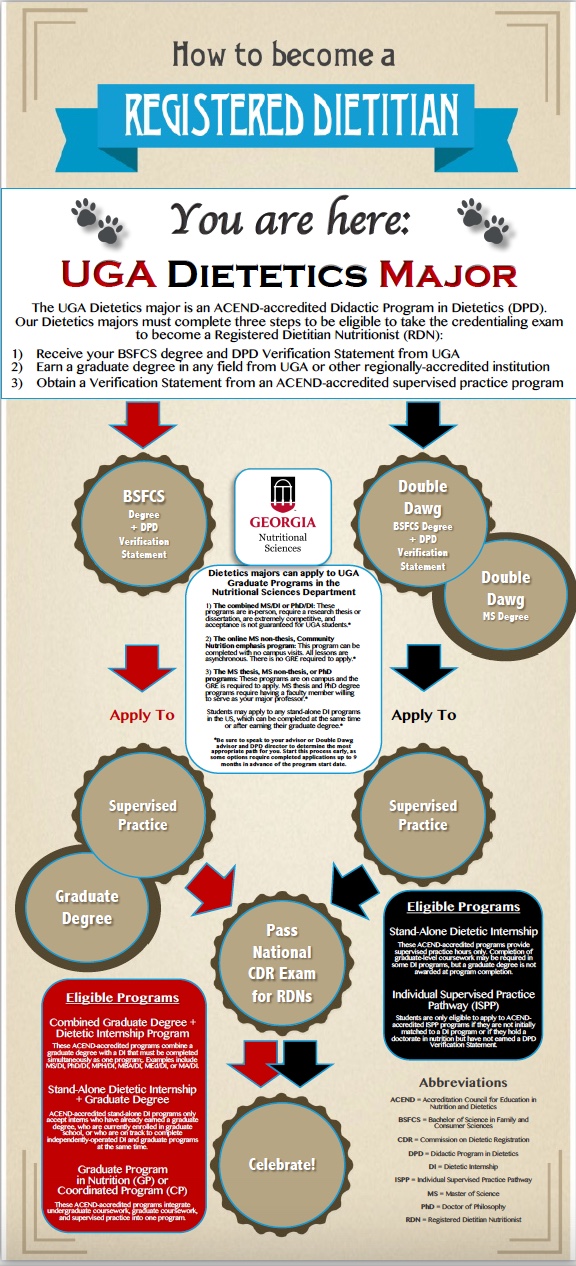How to become a Registered Dietitian Nutritionist (RDN)
At the University of Georgia, students must complete the following steps in order to obtain the RDN credential:
1. Obtain a Didactic Program in Dietetics (DPD) Verification Statement from our Accreditation Council for Education in Nutrition and Dietetics (ACEND)-accredited program via one of the following paths:
- Earn a bachelor's degree in dietetics: Upon successful completion of knowledge and BSFCS degree requirements, dietetics majors will receive their DPD Verification Statement. Students who have met eligibility requirements may apply to our Double Dawgs program, which offers a pathway to obtain both the BSFCS and MS degrees in 5 years or less; or
- Complete post-baccalaureate DPD coursework: Students who have earned a bachelor's degree from a U.S. regionally-accredited institution or foreign equivalent may apply to one of our Post-Baccalaureate programs: Double Dawg DPD, Non-Degree Post-Baccalaureate DPD, or MS+DPD, which offer the required coursework to receive the DPD Verification Statement. Completing an MS-thesis+DPD or a PhD+DPD program of study is also feasible for currently enrolled graduate students.
2. Acquire an advanced degree: Effective January 1, 2024, the Commission on Dietetic Registration (CDR) requires a minimum of a master’s degree to be eligible to take the credentialing exam to become an RDN. Our department offers both in person and online options to pursue a graduate degree. For more information about this requirement, visit CDR's website: https://www.cdrnet.org/graduatedegree.
3. Complete supervised practice: CDR requires that individuals complete their supervised practice (e.g., a "dietetic internship") in an ACEND-accredited program. Graduates who obtain their DPD verification statement from The University of Georgia are eligible to apply to ACEND-accredited supervised practice programs (including the University of Georgia MS/DI or PhD/DI). Acceptance to an ACEND-accredited supervised practice program is competitive and not guaranteed. Available supervised practice programs are listed in the ACEND program directory: https://www.eatrightpro.org/acend/accredited-programs/program-directory
4. Pass a national exam: Graduates must pass the Commission on Dietetic Registration (CDR) credentialing exam for Registered Dietitian Nutritionists. For more information regarding the examination, refer to the CDR website.
5. Obtain licensure in your state of practice, if applicable: In Georgia, graduates must obtain licensure by the Georgia Board of Examiners of Licensed Dietitians in order to practice. Upon completion of our DPD, acceptance to a graduate program that results in a minimum of a master's degree, acceptance to an ACEND-accredited supervised practice program, and passing the CDR credentialing exam for Dietitian Nutritionists (RDNs), graduates are eligible to apply for licensure in Georgia. Additional information and disclosures regarding state licensure for professional practice in nutrition and dietetics can be found at the UGA Licensure Disclosure Portal. The DPD does not grant an advanced degree or provide supervised practice experience as part of the curriculum, but we offer substantial support and mentoring to students to guide them in applying to graduate programs and post-graduate ACEND-accredited supervised practice experiences. In most US states, graduates must obtain licensure or certification to practice. For more information about state licensure requirements, click here.
How to become a Nutrition Dietetic Technician, Registered (NDTR)
1. Obtain your DPD Verification Statement from our ACEND-accredited program (see #1 above).
2. Pass the national NDTR examination administered by the CDR. For more information regarding the examination, refer to the CDR website.
Visit this site to learn more about becoming a Nutrition Dietetic Technician, Registered.



